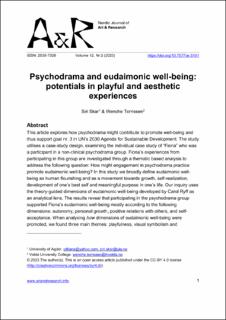| dc.description.abstract | This article explores how psychodrama might contribute to promote well-being and thus support goal nr. 3 in UN’s 2030 Agenda for Sustainable Development. The study utilises a case-study design, examining the individual case study of “Fiona” who was a participant in a non-clinical psychodrama group. Fiona’s experiences from participating in this group are investigated through a thematic based analysis to address the following question: How might engagement in psychodrama practice promote eudaimonic well-being? In this study we broadly define eudaimonic well-being as human flourishing and as a movement towards growth, self-realization, development of one’s best self and meaningful purpose in one’s life. Our inquiry uses the theory-guided dimensions of eudaimonic well-being developed by Carol Ryff as an analytical lens. The results reveal that participating in the psychodrama group supported Fiona’s eudaimonic well-being mostly according to the following dimensions: autonomy, personal growth, positive relations with others, and self-acceptance. When analysing how dimensions of eudaimonic well-being were promoted, we found three main themes: playfulness, visual symbolism and psychodramatic role-playing techniques. The study thus shows that engagement in psychodrama is well suited to nurture human growth and development as an element of promoting good health and well-being. | en_US |
